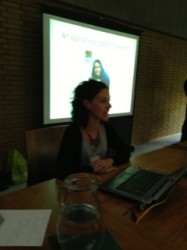Food Studies Program Coordinator Presents at Oxford
Attracting scholars who study food since 1981, the Oxford Symposium on Food and Cookery is the oldest academic conference on food history. Every year academics interested in using food studies as a lens to examine modern (and ancient) societies gather at the prestigious St. Catherine’s College in Oxford to take part in a series of discussions and hear the newest findings on food history.
 Professor Elisa Ascione, the coordinator of the Umbra Institute’s Food Studies Program, was among those presenting at this year’s conference. Each year’s conference has a theme, and this year’s was “material culture”: the artifacts and objects that are used to manipulate food from its “natural” state and the impact they have on the culture of food and the way we eat and cook.
Professor Elisa Ascione, the coordinator of the Umbra Institute’s Food Studies Program, was among those presenting at this year’s conference. Each year’s conference has a theme, and this year’s was “material culture”: the artifacts and objects that are used to manipulate food from its “natural” state and the impact they have on the culture of food and the way we eat and cook.
Within this broader theme, Ascione’s paper focused on the way new objects are charged with meanings and social expectations in Italian modern kitchens, especially for women. Her research explored the way a very popular all-in-one food-processor and cooker, described as a “magic” appliance by its owners, acquired an almost totemic status because it is an “unclassifiable” object that defies symbolic boundaries linked to different activities of transformation. In this paper she shows that food preparation and cooking retains deep symbolic meanings even when it is performed through modern technological equipment.
Ascione’s paper is under consideration for publication in the conference’s Proceedings.